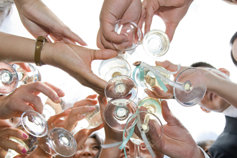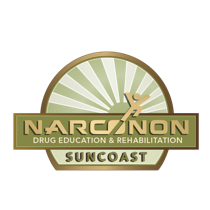How to Not Relapse

Each addict in recovery has their own set of triggers that if left unhandled, can throw them right back into their addictions. Statistically, recovered addicts are most vulnerable to relapse during the first three months after treatment, when they are rebuilding their lives and building new sober habits. The best way to avoid relapse is to identify the addict’s unique triggers while in treatment and develop a strong relapse prevention plan with specific actions needed to neutralize each trigger before they can adversely affect the addict’s sobriety.
Unlike most drug rehab programs, Narconon Suncoast does not consider relapse to be a part of recovery and expects its graduates to stay sober. Narconon Suncoast does so by setting sober expectations early on and also by starting relapse prevention early in treatment. This is done by identifying both the physical and mental relapse triggers and developing practical handlings for each of them.
The Narconon program also helps an addict to identify the problem(s) he was trying to solve when he started using drugs. Drug use is always a false solution to life’s problems. Getting to the root cause of these problems is critical to helping to alleviate the effects that these triggers could have and teaches the individual how to handle tough situations without the use of drugs and alcohol.
A key part of the Narconon Graduate Aftercare Program is relapse prevention. Relapse prevention helps the student to identify situations and environments that might cause him to want to get high or drink and handles those areas of his life, so he doesn’t put himself at risk. While many of these seem like common sense actions, identifying them and drilling how each situation could be handled is key to creating a sober and stable life.
Here are the most common areas of life that can cause an addict to relapse:
1. Going to restaurants, bars and clubs where alcohol is served

One-for-one, this is the most common mistake people fresh out of treatment make. Now, since dining out is an inevitability, the thing to do is to be bold, tell the waiter that your table doesn’t need to hear the drink specials or see the wine list, but that you are still great tippers. Do your research. Find places that are safe to go to, where you can go and enjoy a good meal without a lot of drinking or partying stimuli.
2. Special occasions
Nothing gives a newly sober person more of an excuse to have “just one sip” or “just one glass” than a special occasion where everyone is toasting and celebrating. Any mind-altering substance can lead a recovered addict to more unpredictable behavior. It’s best to pass on the beer or the champagne toast and stay sober—no exceptions.
3. Social situations where drugs and alcohol are available

Sounds like common sense, but the majority of relapsed drug addicts say that parties, events or club environments “took them back” mentally to times when using was just a great experience. They say that just the smell or sight of drugs, alcohol or paraphernalia were the strongest triggers. These items often brought back “pleasurable moments” that tricked them into believing that “just one” was fine. They also reported that the addictive part of their mind never seemed to take them back to the times they were experiencing massive withdrawals or having near death experiences.
4. Sort out your true friends and ensure that “old friends” can’t contact you
The best way to ensure that old, undesirable “friends” don’t call is to get rid of old phones, phone numbers or emails they used to call or write to get in touch.
Memorize the phone numbers of two big sober supporters or sponsors. Put them in the new phone, on speed dial too! In times of weakness or stress, call them, not dealers or drinking buddies.Go through social media and unfriend and block your “old friends.”
5. Stress

Mentally and emotionally stressful incidents can easily have a former addict turn to drugs or alcohol. Learning stress relieving techniques such as taking a walk, doing other physical activities or exercise are all habits that can be put in place instead of turning to substances.
6. Toxic relationships
Effective rehabilitation practices must include identifying relationships that are simply toxic to the addict. Being able to identify anti-social people and pick social, supportive types is key to building a sober life. Anti-social personalities often make the newly sober person feel “blame, shame and regret.” These are hallmark indicators that an anti-social person is at work, making the recovered addict feel bad. These types of people can easily influence them to return to drugs and alcohol in order to tune them out or get away from them. The key to handling toxic people is properly identifying them and getting their negative influences out of the addict’s new life.
7. Social interaction
Having either too much interaction or not enough can cause a newly sober person to relapse. The pressure of “having to perform well” in large gatherings may be just as much as the pressure to “stay away from everyone.” Effective drug treatment will include defining the individual’s ideal level of social interaction. While hiding oneself away for a while to maintain one’s sobriety may work, unless that level of solitude is a familiar and supportive level for the former addict, chances are the “addictive mind” will start talking to them again and drive them right back to the nearest dealer.
8. Physical and emotional pain
These are two common triggers for former addicts. “A couple of beers will make you feel better” may be just what the recovered addict needs to hear to justify a few drinks. An uninformed dentist who unwittingly prescribes painkillers to a recovered addict who wasn’t upfront about their recovery can send a recovered addict spiraling downward fast. Recovered addicts need to be open and honest with their care providers, family and friends, so that they can be supported through times of emotional and physical pain without having to resort to drugs or alcohol.
9. Boredom
If you don’t know what you’re doing next, if you don’t have a plan, someone or something will come along and give you “something to do,” whether constructive or destructive. Boredom is lethal for the recovered addict. The best thing you can do is really take the time to create a detailed plan to support your sobriety. Over time that plan becomes filled with interesting and sometimes “normal” things that can create a regular old, wonderful life!
10. Glory days

Dwelling in the past, be it in the “glory days” or, at the other end of the spectrum, the “blame, shame and regret” days, can easily trigger drug use. The present moment and what is happening now is the only time where recovery takes place. Whether it is one day at a time or, more correctly, one hour or minute at a time, real recovery is in the present, where the addict can choose to remain sober. Relapse starts in the past or in the unknown expanse of the future. Right now, at this moment, when the person is really in the here and now, the choice to be sober and have a good healthy life is always available. Anytime a former addict goes back to visit times that lead to feelings of blame, shame or regret, they tend to get trapped in wishing they could have changed it, done it better, or even worse, start to think things will never turn out better for them. With that kind of thinking, it’s easy to feel bad and justify just one drink or one pill or one line. So while the glorious parts of the past may seem fun and happy, the reality is the death and destruction that comes with their addiction. It’s best to stay in the present and get out of the past any time the addict finds themselves there. A healthy and happy life starts in the “here and now,” where those in recovery can build the best stories of their lives.
Setting sober expectations and practicing effective relapse prevention skills make all the difference in maintaining a new sober lifestyle. Drug rehab is not an easy process. Help set yourself or your loved one up for success, not relapse, by getting to the root problems of addiction and handling them for good.
If you are looking for drug rehabilitation, make sure you find a program that follows these guidelines of relapse prevention and helps an addict maintain their sober life.
Narconon Suncoast is a long term, residential treatment facility located in Clearwater, Florida. More information on their drug-free rehabilitation program and on relapse prevention techniques are available.


